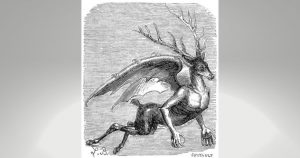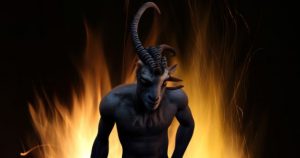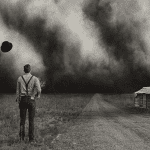 History
History  History
History  Weird Stuff
Weird Stuff 10 Wacky Conspiracy Theories You Will Need to Sit Down For
 Movies and TV
Movies and TV 10 Weird Ways That TV Shows Were Censored
 Our World
Our World 10 Places with Geological Features That Shouldn’t Exist
 Crime
Crime 10 Dark Details of the “Bodies in the Barrels” Murders
 Animals
Animals The Animal Kingdom’s 10 Greatest Dance Moves
 Movies and TV
Movies and TV 10 Box Office Bombs That We Should Have Predicted in 2025
 History
History 10 Extreme Laws That Tried to Engineer Society
 History
History 10 “Modern” Problems with Surprising Historical Analogs
 Health
Health 10 Everyday Activities That Secretly Alter Consciousness
 History
History 10 Dirty Government Secrets Revealed by Declassified Files
 Weird Stuff
Weird Stuff 10 Wacky Conspiracy Theories You Will Need to Sit Down For
 Movies and TV
Movies and TV 10 Weird Ways That TV Shows Were Censored
Who's Behind Listverse?

Jamie Frater
Head Editor
Jamie founded Listverse due to an insatiable desire to share fascinating, obscure, and bizarre facts. He has been a guest speaker on numerous national radio and television stations and is a five time published author.
More About Us Our World
Our World 10 Places with Geological Features That Shouldn’t Exist
 Crime
Crime 10 Dark Details of the “Bodies in the Barrels” Murders
 Animals
Animals The Animal Kingdom’s 10 Greatest Dance Moves
 Movies and TV
Movies and TV 10 Box Office Bombs That We Should Have Predicted in 2025
 History
History 10 Extreme Laws That Tried to Engineer Society
 History
History 10 “Modern” Problems with Surprising Historical Analogs
 Health
Health 10 Everyday Activities That Secretly Alter Consciousness
10 Terrifying Demons with Disarming and Deceptive Names
To answer the famous question posed by Juliet in Shakespeare’s play, there is really quite a lot in a name. A rose by any other name would smell as sweet, but when it comes to demons and other dangerous creatures, deceptively innocent names could make them even more deadly.
A person told not to listen to Belphegor or deal with Mephistopheles or warned of some other creature with a long, foreign-sounding name containing many vowels would probably take it seriously. But try warning them about Amy, Leonard, or—God forbid—Furfur. They hardly sound threatening, but it would be wrong to believe it. This list explains why and gives seven more examples of dangerous demons and mythological beings that hide behind deceiving names.
Related: Top 10 Creepy Stories Of Demonic Possession
10 The Bean Nighe
Warn a walker in Scotland to watch out for the Bean Nighe, and they will probably wonder why they should be worried about a nearby nutritious pulse. However, what hikers should actually be watching out for is an old woman washing bloodstained clothes down by a brook or stream (and it is actually pronounced “ben-nee’-yeh”). If she looks hideous and has webbed feet, then it is best not to get too close because it is the Bean Nighe—the spirit of a woman who died in childbirth—and an omen of death like her Irish relative, the banshee.
According to legend, the clothes she washes are those of people who are about to die. It’s best not to be seen by her, but she grants wishes to those who approach her the right way. That means sneaking up on her and suckling from one of her sagging breasts. One must then claim to be the Bean Nighe’s foster child so she will not harm them.[1]
9 The Abbey Lubber

Death probably does not worry a man who has devoted his life to his faith very much, such as a monk or a priest. His idea of danger is more likely to be the risk of giving in to the temptations he faces during his time on Earth. But it seems that there are folk tales of dangerous demons in disguise who loiter in abbeys, trying to distract monks from their righteous path and tempt them to be greedy, drunk, and indecent. These were known as abbey lubbers, and they were usually said to be found waiting in the wine cellar for victims.
In some cases, they were there to make sure that monks who had already misstepped really went the extra mile to deserve damnation. As it was, many abbeys needed little help in this regard when these tales started to be told in fifteenth-century Europe. In fact, it was the wealth and decadence of the abbeys at the time that likely led to the spread of folk tales like those of the abbey lubbers.[2]
8 Puss of the Corner
Someone who travels to Ireland instead of Scotland need not worry about coming across Puss of the Corner, also known as “Pus an Chuine” or “Cat-head.” The eldest son of a persistent, pesky old witch who kept burning down the same castle every night after it had been rebuilt in the day, Cat-head was killed by the famous hero of Irish folklore, Fin MacCumhail. It was not easy for him, though.
Cat-head, who was named for his most distinguishing feature, fought Fin so fiercely that he survived having the flesh torn from his entire body and having his head cut off. However, Fin had a vision that showed him that he needed the witch’s blood to kill the beast. Luckily, she was already on the way to rescue her son. Fin beheaded her after what was apparently the greatest battle of all time, and the whole time, Cat-head’s cat head was biting his chest. Finally, Fin smeared the witch’s blood all over Cat-head, who instantly died.[3]
7 The Killakee Cat
Another demonic cat that terrified the Irish was the Killakee Cat, also known as the “Beast of Killakee.” Those who have seen it have said that it is a black cat the size of a German shepherd dog with burning red eyes, although it has also been said to take the form of a disfigured dwarf. Its haunting of Killakee House rendered the home unlivable even after it had been exorcised. The house used to be a meeting place for a sinister secret society known as the Hellfire Club. Meetings of the club began with a toast to the Devil, who is even said to have shown up on several occasions, and tales abound of the club’s murders and mysteries.
One regular activity was the sacrifice of cats, which would be doused in alcohol and set on fire. One popular tale is that this ritual was being carried out on a black cat one night when the group was interrupted by a priest, who caused a demon to burst out of the cat’s body. Another story says the group once tortured and killed a little person, and the remains of a child or small adult were actually found there in 1971.[4]
6 Furfur

Despite his cute name, Furfur is not another feline, nor is he anything anyone should ever consider cuddling. He is, in fact, a fallen angel and high up the chain of command in Hell. He holds the title of Earl and commands 26 legions of demons. He appears as a hybrid of deer and human, having the head and hindquarters of a hart—a male red deer—with the chest and arms of a man. He also has bat wings so that he can fly, and his tail is permanently on fire.
Furfur has the power to cause thunderstorms but can be quite helpful if summoned under the right circumstances. For example, if he is placed in a triangle when he is summoned, he takes on an angelic form and will answer questions about secret, divine, or abstract things. If he is not in a triangle, however, nothing he says will be true.[5]
5 Amy
Some demons have names that simply do not sound scary in modern English, and one thing that can cause this is when the name has been independently but widely adopted for other uses. Take the name Amy, which at the time of writing is one of the most popular girls’ names in the U.S. But centuries ago, it was the name given to a great president of Hell who, if one should be so unlucky as to see him, appears first as a fire and then usually changes into a man.
According to the Pseudomonarchia Daemonum, a sort of demonic directory from the 16th century, Amy has 36 legions of demons under his command. He also has a somewhat troubled nature. The Dutch demonologist Johann Weyer has described how Amy hopes to return to Heaven in 1,200 years and take a place among the highest of the angels. Weyer did, however, add that he thinks this will be impossible.[6]
4 Leonard

Most people have heard of Satan, and thanks in no small part to Freddie Mercury, plenty of people have probably heard of Beelzebub, too. They, of course, hold some of the most powerful positions in the hierarchy of Hell. But alongside them is a less well-known demon who goes by the unassuming name of Leonard. It might not be too much of a stretch to imagine that his mundane moniker might be why he has not made it into stories and song lyrics. He does, however, hold some important positions.
Leonard is the Inspector General of sorcery, witchcraft, and the black arts, along with being the Grand Master of Sabbaths. In the latter role, he is said to oversee demonic orgies and banquets. He can take many forms but usually looks like a goat from the waist up, with three horns and flaming eyes. Bizarrely, he is also said to have a face on his butt which he makes witches kiss as a way of worshiping him.[7]
3 Lilith
Lilith, unlike Amy, is actually female, but that does not make her any less fearsome. She is a demonic figure from Jewish folklore, notorious for kidnapping and murdering children as well as seducing men. Legend has it that Lilith was the first wife of Adam from the Old Testament creation story, but after refusing to submit to him, she left the Garden of Eden. Three angels sent by God to find her tracked her down to a cave where she was hiding out and having many children.
The angels killed 100 of her children every day to make her pay for her disobedience. However, Lilith still refused to follow their orders. As revenge, she kills the children of others and is said to be responsible for stillbirths and sudden infant death syndrome (SIDS). While Lilith is still seen by many to be a murderous demon, her original crime was simply exercising her independence. Because of this, Lilith has been adopted by some feminists as a symbol of female independence.[8]
2 The Uncle
The relationship of El Tío—”The Uncle”—to the Bolivian miners who worship him is complicated. His name denotes closeness as if he were family, and he is sometimes generous enough to let the miners leave the mine not only with their lives but also with a good load of silver. On the other hand, the miners must not fear him, even though the punishment for being afraid is itself a cause for fear.
El Tío is said to kill those who fear him and eat their souls. He is usually depicted like the Devil, with horns and red eyes. Miners can worship him by leaving gifts of cigarettes, alcohol, and coca leaves by a statue of him. These can easily be found at any entrance to the mine to remind the workers that they are entering his territory—the underworld. They must ask his permission to extract the precious metals, and the price they must pay him is their soul.[9]
1 Lady Midday
Farmers in Eastern Europe had best not forget to take their lunch break lest they encounter Lady Midday. Also known as the Noonwraith, she is a wandering spirit who believes the midday hour is a sacred time reserved for resting, and she punishes those she finds working through it. Although there are different versions of the legend—she appears in the folklore of several countries, including Russia, Poland, Ukraine, and Serbia. One thing several have in common is that a simple touch of her hand is deadly.
Lady Midday is also commonly said to wear a white robe and use the wind to float around farmers’ fields, although other aspects of her appearance vary from region to region, such as her age, hairstyle, and beauty. Even if someone is not working at midday and they see her, it is best not to strike up a conversation. Some versions of her story say that she will speak incessantly but kill those who turn away from her. Others say she expects her interlocutor to speak about a single topic for a whole hour, or she asks them hard questions. If they fail, they will end up seriously ill, injured, or dead.[10]








